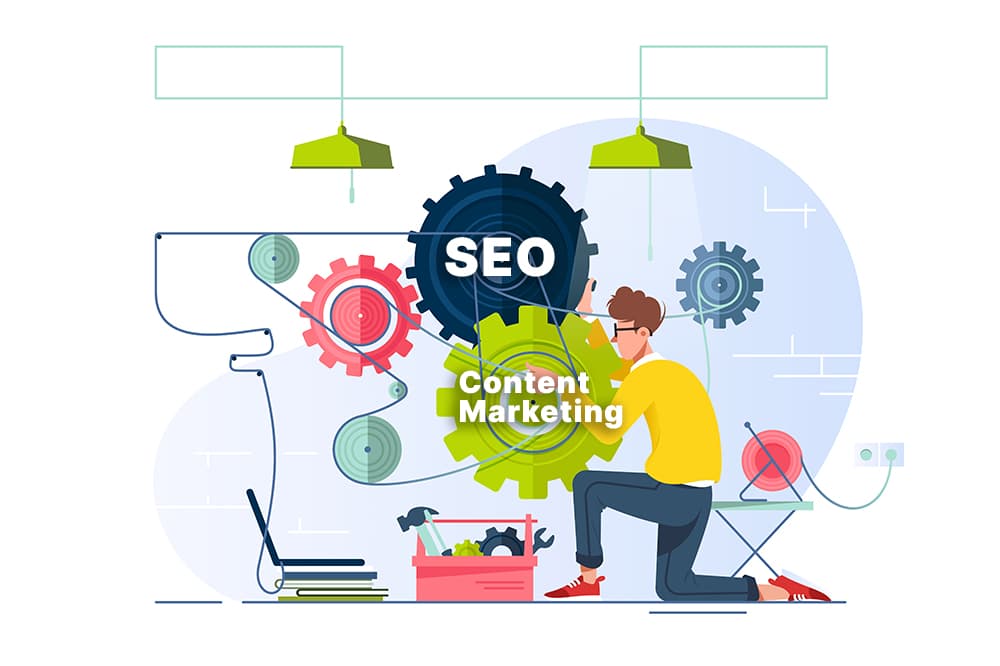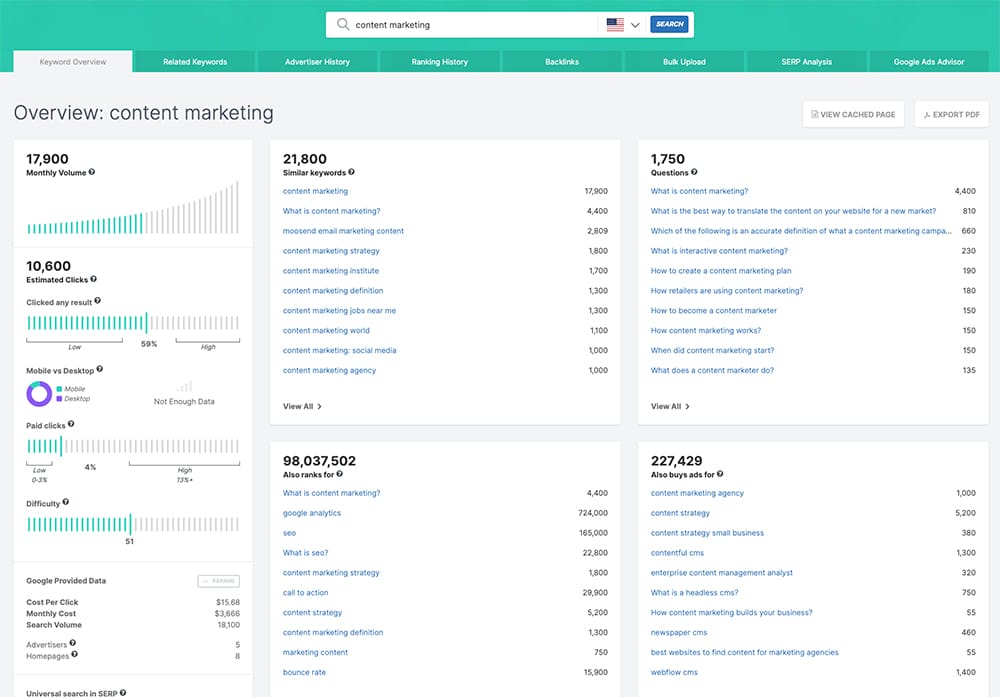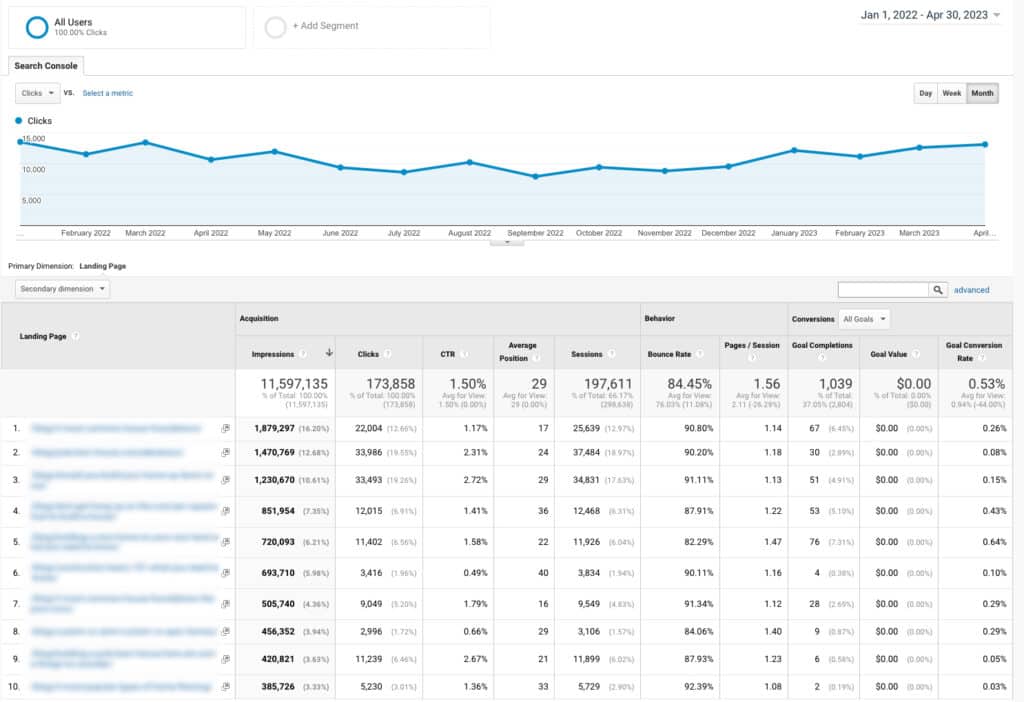In today’s digital world, having a strong online presence is vital for businesses and entrepreneurs alike.
Whether you’re selling products and services or trying to establish thought leadership in your industry, having a solid SEO content strategy is essential for getting discovered online.
In this comprehensive guide, we’ll explore the ins and outs of creating content specifically tailored for search engines, covering everything from keyword research and content creation to on-page optimization and performance tracking.
So, whether you’re new to the world of SEO or looking to refine your content marketing strategy, read on to unlock the secrets of crafting high-performing, engaging, and informative content for the modern web.
Understanding the Importance of SEO Content
SEO content plays a crucial role in content marketing, as it is specifically designed to rank higher on search engines like Google.
Often referred to as “natural” or “organic” search, SEO content is designed to appear at the top of search engine results pages (SERPs) when users type in relevant keywords.
This is essential for businesses and individuals looking to boost their online presence and reach a wider audience.
The relationship between SEO and content marketing is symbiotic; both elements work together to achieve a common goal.

SEO relies on high-quality, relevant content to satisfy search engine algorithms, while content marketing utilizes SEO techniques to enhance the visibility and reach of the content.
High-quality, relevant content means writing or creating content that is well-written, interesting, and relevant to the topic or keywords you are targeting. It should be easy to understand and provide useful information that people are searching for.
By leveraging the power of SEO and content marketing together, businesses can achieve greater success in their content marketing efforts and generate more organic traffic to their websites.
Keyword Research and Selection
Keyword research is a critical component in creating SEO-optimized content.
Keywords are the terms and phrases that users type into search engines, and they play a significant role in determining which websites appear in search results.
By targeting the right keywords, you can increase the chances of your content being found by potential customers.
There are various tools and strategies you can use for effective keyword research.
Some popular tools include:

When conducting keyword research, consider both the search volume and the competitiveness of each keyword.
Aim to target keywords that have a high search volume but low competition, as these are more likely to drive organic traffic to your website.
Did you know
ConvertIQ does all the keyword research for you then tells you exactly what to write almost instantly, saving you money and hours upon hours of time.
Creating High-Quality, Engaging Content
The quality of your content plays a significant role in the success of your SEO efforts.
Search engines prioritize high-quality, engaging content that provides value to users.
To create content that both search engines and users will appreciate, focus on writing informative, well-researched, and engaging pieces that genuinely address the needs and interests of your target audience.
Striking the right balance between keyword usage and readability is crucial for SEO.

While incorporating keywords is necessary for search engines to understand the topic of your content, overstuffing your text with keywords can harm your rankings and deter users.
To avoid this, use keywords naturally throughout your content and pay close attention to user experience.
Aim to write for both humans and search engines, creating a captivating narrative that makes the reader want to keep reading.
At the end of the day, the user is reading your article to find a solution to their problem, so make sure you provide them with helpful advice to do so!
On-Page SEO Optimization
On-page SEO optimization involves refining individual web pages to improve their search engine ranking and enhance the user experience.
Key elements of on-page optimization include:
- Optimizing page titles and meta descriptions
- Using proper header tags (H1, H2, H3, etc)
- Ensuring images are optimized with alt text
Page Titles & Meta Descriptions
A well-crafted title should be concise, include your target keyword, and accurately represent the content of the page.
Meta descriptions should provide a brief summary of the page content while also incorporating relevant keywords.
Both elements should be written with the user in mind, making them informative and enticing.
Header Tags
Header tags (H1, H2, H3, etc.) are essential for organizing your content and making it easily navigable for readers.
They also help search engines understand the hierarchy and structure of your content.
The H1 tag should be reserved for your main page title, while H2 and H3 tags should be used for subheadings and supporting points.
Including keywords in your header tags can further improve your content’s SEO.
Image Optimization
Large, unoptimized images can slow down your website, negatively impacting both user experience and search engine rankings.
To optimize images, compress them to reduce file size without sacrificing quality, and ensure they are properly formatted (e.g., JPEG for photos and PNG for graphics).
Additionally, including descriptive alt text for your images can improve accessibility and provide search engines with valuable context about the image content.
Structuring Your Content for SEO
Content organization and formatting play a crucial role in SEO, as well-structured content is both easier for search engines to crawl and more enjoyable for users to read.
- Utilizing subheadings and bullet points
- Including lists when appropriate
- Linking to other relevant pages on your website
- Linking to authoritative sources outside your domain
- Organizing your content into short paragraphs to improve readability
These not only improves the user experience but also allow search engines to better understand the hierarchy and relevance of your content.
Internal and external linking strategies are essential for guiding readers through your website and providing additional resources for them to explore.
Internal links connect your content to other relevant pages on your site, while external links point to authoritative sources outside your domain.
Search engines use these links to evaluate the credibility and depth of your content, so be sure to include a mix of both in your SEO content strategy.
Did you know
Internal and external link suggestions are built into ConvertIQ. Easily "wire up" your links to the appropriate keywords with the click of a button.
Measuring the Performance of Your SEO Content
To ensure that your SEO content is effective in driving organic traffic and increasing search engine visibility, it’s crucial to measure its performance.
This involves monitoring key performance indicators (KPIs) that provide insights into how well your content is performing.
Some common KPIs for SEO content include:
- organic search traffic
- time on page
- bounce rate
- conversions (phone calls, form submissions, chats, e-commerce purchases, etc)
There are many tools available to help track and analyze content performance, such as:

With these tools, you can track a variety of metrics related to your SEO content’s performance, such as organic traffic and keyword rankings.
By analyzing this information, you can identify areas for improvement and make data-driven adjustments to your content marketing strategy.
When reviewing performance data, it’s essential to consider both short-term and long-term trends.
While immediate results can be valuable, it’s crucial to monitor the ongoing effectiveness of your SEO content over time.
SEO can take anywhere from a few weeks to several months to start yielding results, depending on the competitiveness of your industry and the quality of your content.
So it is important to be patient and consistent with your SEO efforts.
Staying Up-to-Date with SEO Best Practices
The ever-changing landscape of SEO necessitates continuous learning and adaptation.
Search engine algorithms are constantly evolving, making it crucial for businesses and marketers to stay informed about the latest updates and techniques.
Make sure to keep abreast of the latest update announcements and changes in SEO algorithms so that you can adjust your content accordingly.
One key to staying ahead in the SEO game is following reputable sources and industry experts.
Subscribe to leading SEO blogs, newsletters, and podcasts such as:

Attend industry conferences and webinars to learn from experts and network with fellow professionals.
Following industry trends and updates on social media can also help you stay informed.
Many SEO professionals are active on Twitter and LinkedIn, so these platforms can provide great insight into the ever-evolving SEO landscape.
Case Study: Successful SEO Content Implementation
Reinbrecht Homes, a small home builder located in Southern Indiana, was struggling to get results from their marketing strategy which involved radio and billboards.
After launching a new website and implementing a content strategy for SEO, their business experienced remarkable growth.
Website Performance
In March 2015, Reinbrecht Homes launched their first website.
Despite their traditional marketing efforts, their website only had 641 users, 11,336 sessions, and 29,418 pageviews over the next 1 year, 7 months, and 9 days.
The website failed to generate the desired results and Reinbrecht Homes struggled to attract potential customers to their business.
However, in November 2016, Reinbrecht Homes launched a new website and implemented a content strategy for SEO.
This strategy helped them to attract more visitors to their website.
In 2022 alone, their website had 178,875 users, 223,164 sessions, and 473,427 pageviews.
The website’s performance has skyrocketed and Reinbrecht Homes’ business has experienced tremendous growth.

Impact on Business
The website’s increased visibility and traffic helped them to attract more potential customers to their business.
This, in turn, led to a surge in sales and growth for their business.
Reinbrecht Homes’ revenue increased substantially over the years, and they became a well-known home builder in Southern Indiana, thanks to their successful website and content marketing strategy.
Lessons Learned
The case of Reinbrecht Homes highlights the importance of having a solid content marketing strategy in today’s world.
A website is no longer just a digital brochure but a powerful tool that can drive growth and revenue for a business.
Reinbrecht Homes’ first website failed to generate results because it lacked a clear strategy.
However, their second website and content strategy were designed to attract potential customers to their business, and it worked.
Reinbrecht Homes’ success is a reminder that businesses must adapt to changing times and embrace digital marketing strategies to stay competitive in today’s market.
Conclusion
As we’ve explored in this comprehensive guide, creating SEO-optimized content is essential for businesses and individuals looking to improve their content marketing strategies, increase search engine visibility, and drive organic traffic to their websites.
By conducting effective keyword research, crafting high-quality and engaging content, and staying up-to-date with SEO best practices, you’ll be well on your way to success in the digital landscape.

To take your content creation and SEO optimization efforts to the next level, consider leveraging the power of AI with a tool like ConvertIQ.
Our AI-powered content strategy engine can help you plan, write, and edit your content more efficiently while providing valuable SEO insights and generating first drafts for your articles.
Give ConvertIQ a try and let us help you achieve your content marketing goals and boost your search engine visibility today.
